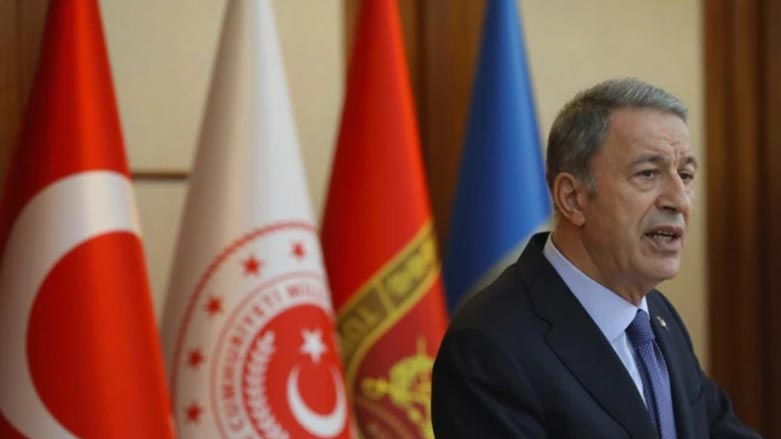Turkey and Russia discuss cross-border assault on Syria, as tensions rise with Kurds

WASHINGTON DC, United States (Kurdistan 24) On Saturday, in an end-of-the-year press conference, Turkish Defense Minister, Hulusi Akar, revealed that Ankara was holding discussions with Moscow to reach an understanding that would allow Turkey to carry out a cross-border ground offensive against the Kurdish People’s Protection Units (YPG), which form the core of the Syrian Democratic Forces (SDF), the principal U.S. partner in the fight against ISIS in Syria.
In Saturday’s briefing, the Turkish Defense Minister said that “Ankara was in talks with Moscow, which supports Syrian President Bashar al-Assad’s forces about the operation,” Reuters reported.
Turkey wants to use Syrian airspace to support a cross-border offensive. “We are in talks and discussing with Russia all issues, including opening the airspace,” Akar stated.
Turkey sees the YPG as the Syrian branch of the Kurdistan Workers Party (PKK)—considered a terrorist organization by Turkey, the European Union, and the United States. On the other hand, the U.S. sees the YPG as distinct from the PKK and considers it a valuable ally in the fight against ISIS.
Turkey blames the YPG for the Nov. 13 bombing in Istanbul that killed six people. Starting a week later, on Nov. 20, Turkish forces began bombing and shelling YPG targets in Syria. However, both the YPG and PKK have strongly denied Turkey’s charge. Some have claimed that it would seem more likely that ISIS, rather than any Kurdish group, was behind that bombing.
Read More: US: Turkish-backed group killed head of ISIS last month—throws new light on Istanbul bombing
U.S. officials have repeatedly warned Turkey against any cross-border attack. They worry it would disrupt military operations against ISIS. Most recently, on Thursday, Secretary of State Antony Blinken conveyed that message in a phone conversation with his Turkish counterpart, even as the head of CENTCOM, Gen. Michael Kurilla, also on Thursday, expressed his apprehension about just such a scenario. “I am very, very concerned about that,” he said.
Tensions Rise After Murder of Kurds in France
On Friday, three Kurds were murdered, and three others injured by a 69-year-old Frenchman at a Kurdish Cultural Center in Paris and nearby Kurdish restaurant and hair salon.
The man, identified only as William M., has a history of anti-immigrant violence. After his arrest, he was diagnosed with a significant mental issue and moved to a prison psychiatric unit. His own father had earlier denounced him. After a previous arrest, the father had said of his son, "He is crazy, he's an idiot.”
Read More: Suspect in Paris shooting transferred to psychiatric unit
The Ahmet Kaya Cultural Center, which William M. attacked, is “a rallying point for the [Kurdish] community” and “home to the Centre Democratique Kurde de France (CDKF),” Le Monde reported, describing the CDKF as “the legal front for the PKK in France.”
As Turkey seems prepared to blame the PKK for terrorist attacks, like the Istanbul bombing, despite offering no evidence, the PKK appears fully prepared to reciprocate. It has blamed Turkey for Friday’s murders, although the gunman is French, and no evidence has emerged to support the PKK’s charge of Turkish involvement.
The CDKF organized a protest on Saturday, and PKK flags flew prominently. But “if one face dominated the demonstration,” Le Monde reported, “it was that of Abdullah Ocalan, the leader and founder of the PKK, who is imprisoned in Turkey.”
“The PKK,” the French paper continued, “had wanted to make the demonstration a moment of recollection, as much as a demonstration of strength in the heart of France and the European Union, which still classifies it as a terrorist organization.”
But did it work? Saturday’s protest followed a more spontaneous protest on Friday. Both turned violent and resulted in the injury of 31 police officers and the arrest of 11 protestors.
Risks to Kurds
France is very sympathetic to the Kurdish people, but actions, like violent demonstrations, risk alienating those sympathies in France—and elsewhere in Europe.
Even more, they risk playing into the hands of hostile parties, above all, Turkey. Ankara is pushing for a cross-border attack into northeast Syria, as Akar said on Saturday. The violence in Paris can be used by Turkish officials to further justify such an assault: the PKK and YPG are terrorists, as events in France show, so we need to attack them in Syria too.
Read More: The murder of Kurds in Paris: what we know now
Such developments also strengthen Turkey’s hand, as it demands concessions from Sweden and Finland in exchange for approving their bids to join NATO. Ankara claims they are too hospitable to Turkish dissidents, including Kurds, and it wants the two countries to agree to deport such individuals back to Turkey.
